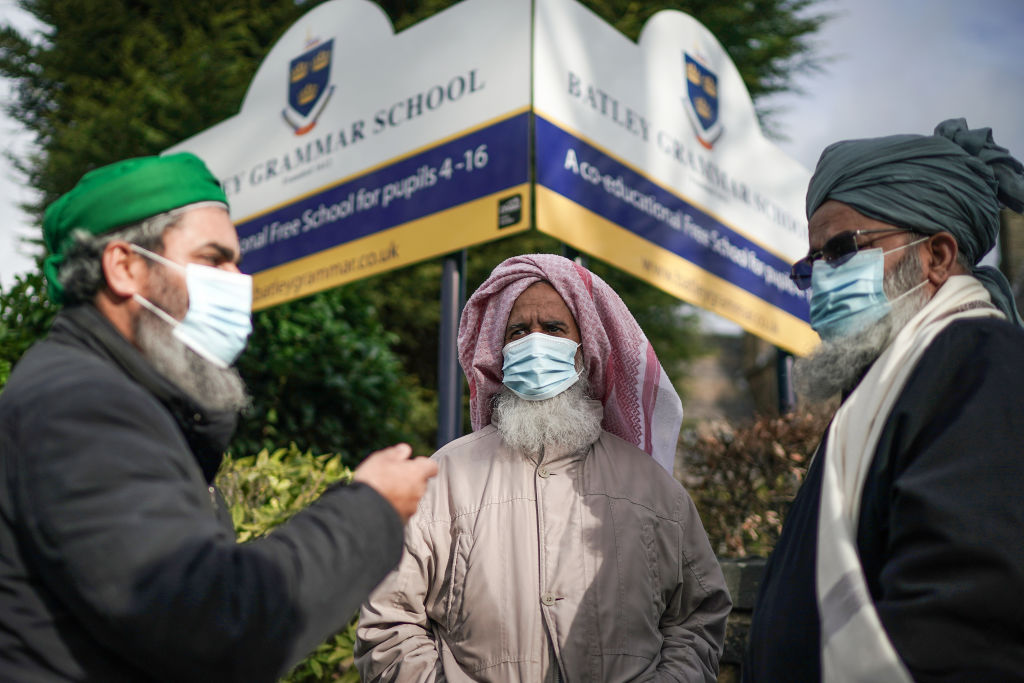Thanks to the newly published Khan review, we now have the clearest picture to date of what actually happened in Batley in March 2021, when a schoolteacher was forced into hiding after showing caricatures of the Prophet Muhammad.
The review clearly lays out the personal impact that the saga had on this innocent man, something which was sorely lacking in investigations and reviews at the time, as well as in the statements of key local leaders — which focused almost entirely on the supposed offence caused.
This is symptomatic of the guiding principles and priorities of too many institutions, which privilege “local dynamics” and “community relations” at the expense of the overall health of British democracy. Usually, attempting to “sooth community tensions” just means cowing to the loudest voices of self-appointed community leaders. It also means that, elsewhere, religious institutions with clear extremist tendencies continue to receive funding and photo ops with local politicians, because maintaining the relationship with that institution and its proclaimed access to the nebulous “community” is more important than anything else.
What makes that approach even more dangerous in this case is the authorities’ failure to wake up to the fact that they were in the eye of a blasphemy storm. West Yorkshire Police initially assessed that Batley was a “neighbourhood incident”, to be dealt with by neighbourhood officers. Yet this makes little sense: from Sir Salman Rushdie and Theo Van Gogh to Jyllands-Posten, it’s clear that blasphemy affairs are global, not local, and you don’t need to be a public figure to find yourself a target. That the Batley incident came just six months after the beheading of schoolteacher Samuel Paty in France, as well as the ensuing international fallout, demonstrates unforgivable myopia and naivety.
In 2022 and 2023, protests outside Cineworld theatres and the Wakefield Quran “scuffing” incident show that few lessons were learned, as authorities again failed to understand they were confronting a blasphemy problem. This left cinema managers and the mother of an autistic schoolchild to fend for themselves. The case of Batley was not dissimilar.
Blasphemy has been a key front for both Sunni and Shia Islamists against the West since the 1989 Satanic Verses fatwa. But the main driver behind the increased frequency of blasphemy disputes in Britain is the increasingly radicalised fervour of Barelvi extremists in Pakistan. There, extremist movements such as the Tehreek-e-Labbaik (TLP) venerate the Bradfordian murderer of a Glaswegian shopkeeper accused of blasphemy alongside the assassin of Salman Taseer, the governor of Punjab who defended Asia Bibi. Their supporters have openly called for jihad at protests in Britain.
However, as one police officer told the review, the lack of training on such issues is “dismal”, covering reminders such as remembering to take off your shoes in a mosque, but leaving few with any understanding of “the Sunni–Shia schism never mind other sects”. Of course, this includes “Barelvi clerics who preach murder for anyone who insults the Prophet”.
The officer is right to raise the alarm. Blasphemy extremism is a malignant growth in Britain that will metastasise the more it is left unchecked. It also feeds off the cowardice and complacency of democratic institutions which, in attempting to stay on the right side of blasphemy allegations, only embolden the accusers.
Others are hesitant to speak up on these controversies out of the bogus fear of fuelling a far-Right narrative, but nothing has fuelled a far-Right narrative like the cowardice of liberal institutions in the face of extremism. The shameful abandonment of the Batley schoolteacher cannot now be undone, but its repetition can be prevented.











Join the discussion
Join like minded readers that support our journalism by becoming a paid subscriber
To join the discussion in the comments, become a paid subscriber.
Join like minded readers that support our journalism, read unlimited articles and enjoy other subscriber-only benefits.
Subscribe